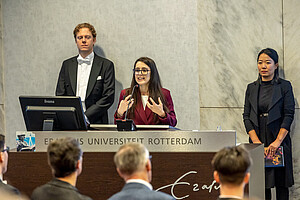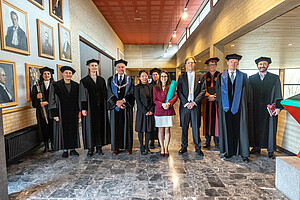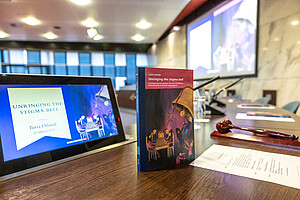PhD Defence Ilaria Orlandi

In her dissertation, Unringing the Stigma Bell: Investigating Informational and Social Mechanisms Behind Boards of Directors’ Appointments, ERIM’s Ilaria Orlandi focused on how people make decisions when a lot of information is unknown or kept hidden. Ilaria examined this by exploring the appointment of directors by board members: How do board members gather information, evaluate it, and make their decisions?
Ilaria defended her dissertation in the Senate Hall at Erasmus University Rotterdam (EUR) on Friday, 10 March 2023. Her supervisors were Prof. dr. Pursey Heugens (RSM) and Prof. dr. Vilmos F. Misangyi (The Pennsylvania State University). Other members of the Doctoral Committee were Prof. dr. Cynthia E. Devers (Virginia Tech University), Prof. dr. Taco Reus (RSM), and Prof. dr. Tal Simons (RSM).
About Ilaria Orlandi

Ilaria Orlandi (Rome, 1991) was a doctoral candidate in Strategic Management & Entrepreneurship at the Rotterdam School of Management, Erasmus University. Ilaria earned her Master in Philosophy (MPhil) degree in Business and Management in the field of Organizational Behavior (cum laude) from the Rotterdam School of Management (2015) and her Bachelor degree (BSc) in Economics and Business Economics (cum laude) from the Erasmus School of Economics (2013).
During her PhD, Ilaria was a visiting scholar at the Management & Organization department at the Smeal College of Business at the Pennsylvania State University. As of September 2021, Ilaria is an Assistant Professor at the Strategy and Innovation Department, Copenhagen Business School.
Ilaria’s research passion is situated in the behavioral corporate governance field: she is broadly interested in understanding how (ir)rational factors influence boardroom decision-making with a particular interest in the director selection process. She studies how stigma influences firms’ decisions in the directors’ labor market and how directors’ expectations concerning present and future job roles and opportunities shape their decision-making. Ilaria seeks to understand which factors might benefit or disadvantage directors in their role, including stigma, biases, social norms, and motivation, in order to highlight their relevance to scholars, practitioners, and society at large.
Ilaria has already published some of her work in the Journal of Management highly competitive review issue. She has won multiple awards at several international conferences, including the Academy of Management and the Strategic Management Society, as well as teaching awards. Ilaria has also presented her work at many international conferences, invited workshops, and invited talks for both academics and practitioners.
Thesis Abstract

How do people make decisions? Traditionally, scholars would agree that decision-makers go through three steps in the decision-making process: (i) gathering information, (ii) evaluating such information, and (iii) deciding. Scholars have unveiled several important mechanisms and details about how information asymmetry influences the information gathering step or how social factors can shape the evaluation step in decision-making. Yet, little is known about how information asymmetry during the information gathering step of decision-making influences which social factors focal actors use in the evaluation step. My dissertation integrates the research streams on information asymmetry and social evaluations in the decision-making process. Specifically, in the three studies in this dissertation, I advance the decision-making field by theorizing more comprehensively about the actors’ decision-making process.
Overall, the studies in this dissertation contribute to the literature on decision-making by showing that it is important to study the interplay between information asymmetry and social evaluations to better understand how individuals make decisions. My broad intent with these studies is to urge decision-making scholars to embrace the complexity behind how individuals, and especially individuals at the top of organizations, make decisions. I also aspire with these studies to broaden our collective understanding of how individuals make decisions by leveraging the informational, social, and cognitive nuances via the integration of different theoretical insights.
View photos of Ilaria's PhD Defence
Photos: Chris Gorzeman / Capital Images


